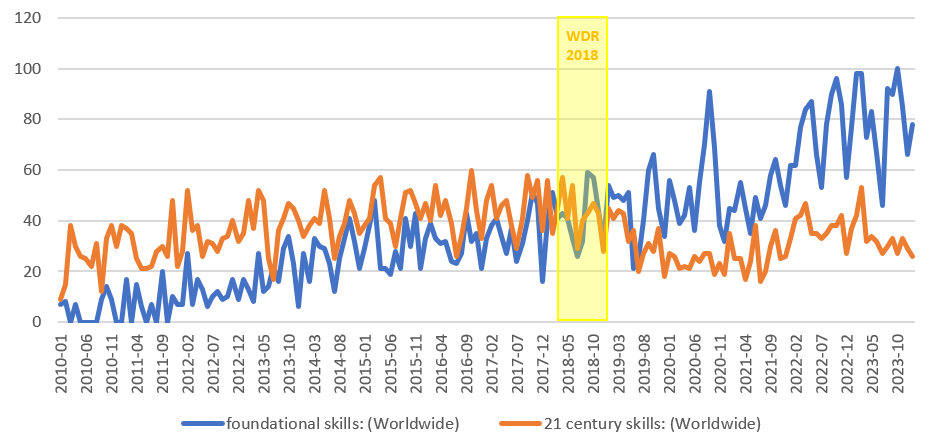 Elemntary students in class. | © shutterstock.com
Elemntary students in class. | © shutterstock.com
Fifteen years ago, while I was working in the Mexican Ministry of Education (2008 to 2011), there was a significant focus on developing what is known as the 21st century skills. These skills included computing, foreign languages, creativity, critical thinking, and various soft skills. Although these skills are undoubtedly important, focusing on them took attention away from the less exciting challenge of ensuring that all students achieve a basic proficiency level of literacy and numeracy. By prioritizing 21st-century skills, education systems implicitly assumed that the core skills of numeracy and literacy were either already universal or no longer relevant. However, foundational skills such as numeracy and literacy are and will remain relevant throughout the 21st Century. Worryingly, over half of all students in low and middle-income countries, most from disadvantaged backgrounds, cannot read and understand a simple story or know how to use basic math operations to solve everyday problems by the end of primary school.
The Importance of Foundational Skills in the 21st Century
While the 21st century skills are undoubtedly relevant for those who have already attained basic foundational skills, they should not take precedence over the fundamental skills that form the basis of education. Universalizing foundational skills should be a priority as it could deliver significant productivity gains and reductions in poverty and income inequality in a single strategy. The World Development Report (WDR) 2018 helped shift the focus from 21st century skills to the more pressing challenge of providing basic foundational skills and giving voice to millions of poor students in developing nations. This is evident in the comparison of worldwide searches for “21st century skills” and “foundational skills” since 2010, highlighting the shift in focus towards foundational skills, coinciding with the publication of the WDR 2018 (Figure 1).
Figure 1: Worldwide search trends, “foundational skills” vs. “21-century skills”, 2010–2024 (daily searches, Google Trends)

Foundational Skills and the Future of Work
Ensuring universal foundational skills is not only an economic and moral imperative, but also the best strategy to guarantee that a large share of society benefits from technological progress. Foundational skills have been essential to economic growth since the Industrial Revolution, as they promote innovation and enable the effective use of new technologies. Contrary to some beliefs, basic literacy, numeracy, and social skills have become even more important with the emergence of new technologies. A recent World Bank report highlights the critical role of foundational skills in performing tasks that complement new technologies. Companies implementing automation, robotization, big data, or AI increase the number of non-routine cognitive tasks and social tasks undertaken in the workplace. Workers with higher levels of numeracy and literacy are better equipped to handle these tasks. Additionally, evidence from the US demonstrates that the demand for social skills such as teamwork, collaboration, and problem-solving has increased over the last four decades, a trend attributed to adopting new technologies. Human interaction in the workplace provides benefits machines cannot yet replicate.
The labor markets of the future will be heavily influenced by rapid technological advances and changes in how businesses operate. Just like in the past, new occupations will emerge, job tenures will decrease while job switching will increase. With the acceleration of technological progress, professional competencies specific to certain sectors or industries will become outdated quickly. These changes mean that workers of tomorrow will need to reinvent themselves professionally from time to time. This presents a significant challenge for education systems—and especially to vocational education and training (VET) systems, which must anticipate the skills and professional competencies that will be in demand in the future—a task that is very hard to fulfill today and it will become even more complicated as technology advances. It also means that workers will thrive only if they have the core skills that allow them to learn new skills or to reinvent themselves completely.
Given the importance of foundational skills in an ever-changing labor market and the fact that a significant share of the workforce left school without these skills, active labor market programs (ALMP) should consider including numeracy, literacy, and social skills in their training options. Public employment offices could assess the attainment levels in numeracy and literacy among job seekers and determine who would benefit from a course on foundational skills.
The next challenge: Defining, measuring, and building social skills.
While we have made progress in understanding how to teach and develop numeracy and literacy through standardized tests and experimental studies, there is still work to be done in defining and measuring social skills. Social skills such as teamwork, empathy, and problem-solving are equally important for succeeding in the job market and achieving life goals. Unfortunately, there isn't a clear consensus on how to define and measure social skills. As a result, understandingour understanding of how these skills are developed is still in its early stages. We must define and measure social skills systematically to conduct further research and fully understand how to improve them. This agenda links research, innovation, and policy, all working towards benefiting the most marginalized.


Join the Conversation